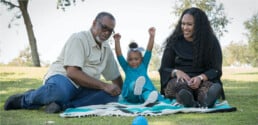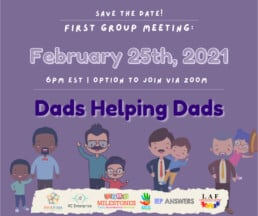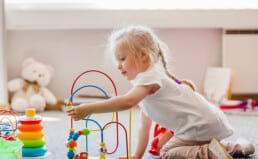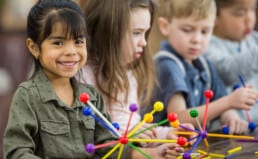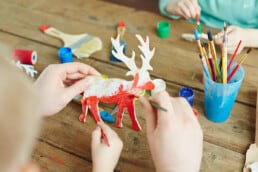Daily Communication is Key! What do your responses tell your child?
Back-and-forth moments with you, shape a child’s growing mind. These positive and supportive experiences with you help their brain grow strong and flexible.
When your child seems fussy, try singing a rhyme or a song. Do they calm down when your voice is quiet, or do they respond to big facial expressions and an enthusiastic voice? Try different rhymes and songs to find their favorites.
When you respond to your child’s movements and sounds, you build a trusting relationship that supports future learning. You also teach them ways to deal with stress while building a love of language. Communication through social play such as eye contact, imitating facial expressions, and a soothing voice help demonstrate positive interactions and builds relationships.


Five Fish Foundation and Milestones Early Intervention Services (MEIS) amongst other organizations to launch and manage the Dads Support Group
Rossiter & Cummaro Enterprise (RCE) and its affiliate Milestones Intervention Services
have partnered with Five Fish Foundation and Milestones Early Intervention Services (MEIS) amongst other organizations to launch and manage the Dads Support Group, a program designed to provide special attention, resources and a platform for dads, often times forgotten in the challenge of caring for children with developmental delays.
Please share this invitation with as many people you know might be in need of this platform.
For any questions, please call us at: (863) 999-4214 or email us at: questions@rcelive.com
MEIS Investors Reach out to Community Organizations on Giving Tuesday 2021
Lakeland Florida
December 1, 2020
Rossiter & Cummaro Enterprise (RCE) is pleased to support Five Fish Foundation, Achievement Academy and Learning Resource Center on Giving Tuesday 2020. These organizations’ missions align with RCE’s
mission and vision.
Born out of a personal commitment a few years ago, Five Fish Foundation provides much needed assistance to individuals with developmental challenges. Their programs and services facilitate access to
approved therapies, programs and products that promote support, care, acceptance, quality of life and education to benefit families in South Carolina.
Achievement Academy has been a beacon of hope for Polk County families faced with the special challenges of caring for a child with developmental delay. “Giving Tuesday is a great day to give a gift that will make a difference in the lives of children who need it the most” (Achievement Academy).
The Learning Resource Center has been a community pillar helping children, as well as adults, reach their educational potential. The services they provide from one on one tutoring to GED preparation make a tremendous difference in the lives of so many children and adults throughout Polk County.
“We feel blessed to be able to reach out and support those organizations who have exemplified the best we can offer to families faced with the challenge of ensuring the best quality of life for their children” said Mr. James Cummaro, President of RCE.
RCE is committed to continually partner and collaborate with organizations who work to improve families throughout our communities thru its administration and upcoming platform: Milestones Early
Intervention Services (MEIS).
For questions on RCE’s programs, please contact, Jessica Gardner, Business Development Director, (813) 754-7777, Jessica@rcelive.com
MEIS Investors Consolidate Relations with Five Fish Foundation
The President and CEO of Rossiter & Cummaro Enterprise (RCE) were welcomed by Five Fish Foundation on Monday, December 21, 2020 in Charleston, South Carolina. RCE has committed to support Five Foundation because the organization’s mission aligns with RCE’s mission and vision.
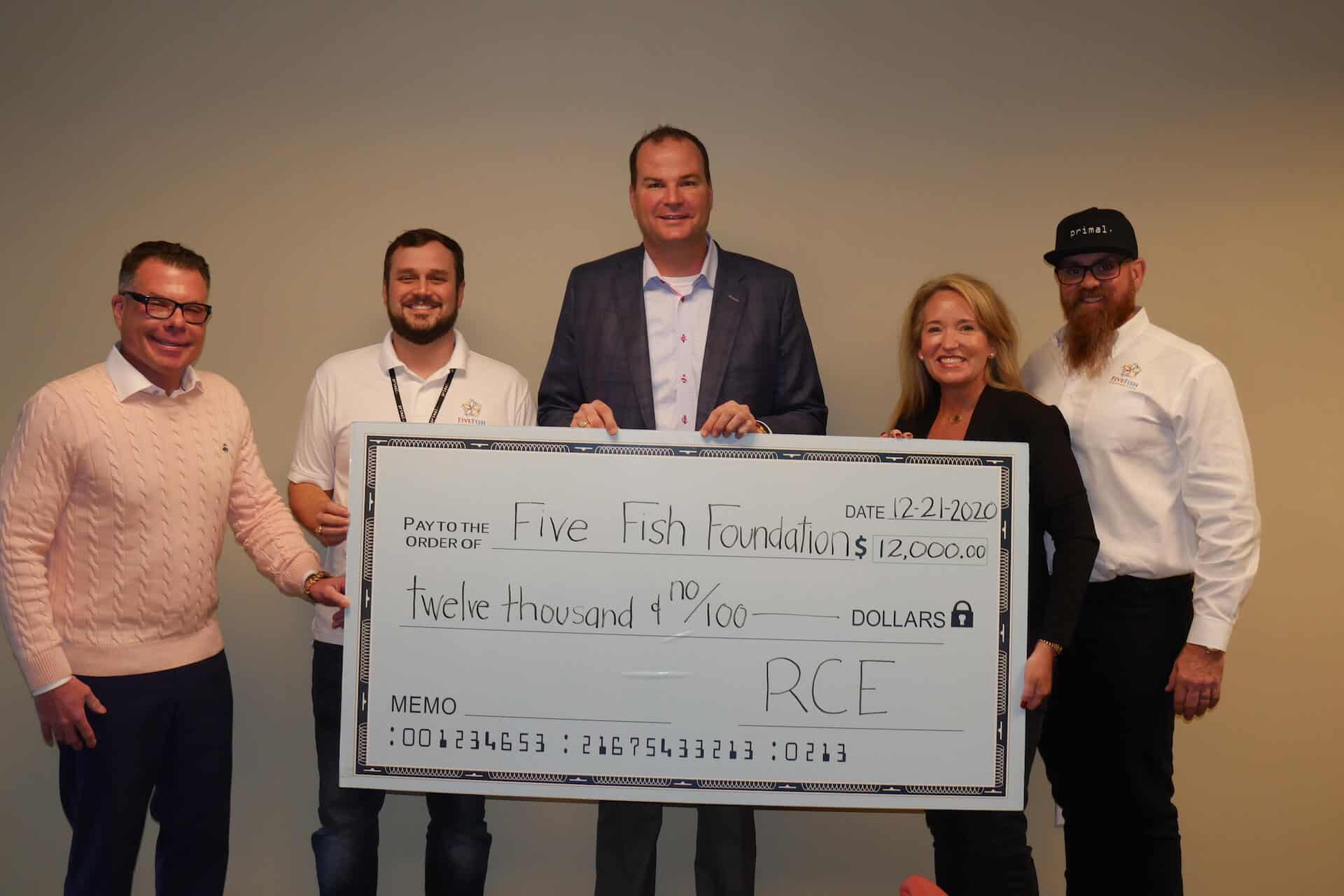
Born out of a personal commitment a few years ago, Five Fish Foundation provides much needed assistance to individuals with developmental challenges. Their programs and services facilitate access to approved therapies, programs and products that promote support, care, acceptance, quality of life and education to benefit families in South Carolina.
“We are privileged to have the ability to support Five Fish Foundation and the families that they serve. It is every parent’s dream to be able to ensure the best quality of life for their children” said James Cummaro, President of RCE."
"We are honored to accept this generous gift and commitment of support from RCE. As partners, we have great things in store in 2021 to further support the families we serve," said Five Fish Foundation Founder, Lisa Leask. RCE and Five Fish Foundation plan to launch multiple programs in 2021 in support of the special needs families in Lowcountry."
RCE is committed to continually partner and collaborate with organizations that work to improve families throughout our communities thru its administration and upcoming platform: Milestones Early Intervention Services (MEIS).
For questions on RCE’s programs, please contact, Jessica Gardner, Business Development Director, (813) 754-7777, Jessica@rcelive.com. Five Fish Foundation can be reached at: 571-235-1621 or lisa.leask@fivefishfoundation.org.
Easy steps for choosing a learning center – find just the right place
It’s your child’s first official year of school, and you’ll be amazed by how much she flourishes in kindergarten. How can you help your child succeed from her very first school day? Help her build self-confidence when it comes to learning; by being her biggest cheerleader you’ll instill a love of learning that will last throughout her life and will help her meet specific goals each year.
There will be focus throughout this year on mastering letters, sounds, and words. You’ll watch with delight as she takes her first steps toward reading and writing correctly, especially when those activities are linked, both at school and at home. Help your kindergartner have fun with language in everyday life this year and watch as her vocabulary explodes.
She will learn key fundamentals of math this year, too, and there will be countless ways (no pun intended) to encourage this. Educational standards vary across states, districts, and schools, and no two children learn at exactly the same rate, so don’t panic if your little one doesn’t start to read at the same time as the neighbor’s kid.
Letters and Sounds
It's always better to start them on easier books, because then they feel successful, and that spurs them on, so they'll read more.
They will also write short, simple sentences such as “The cat ran home.” Keep a special box or bin at home filled with writing materials (crayons, pencils, markers, paper, and notepads) so your child can practice writing simple sentences about special things he’s done or seen during the day. Ask about what he’s written, and have him read it aloud. Offer encouragement by displaying his writings on the refrigerator or on her bedroom wall.
Numbers and Counting
Get your kindergartner to look for the numbers one through 30 in magazines and newspapers. He can cut them out, glue them on paper, and put them in order. When you’re riding in the car or waiting in line, play a game of “What comes next?” Give your child a number and ask him to identify the following number. At bedtime, ask him to count how many stuffed animals he has, and ask, “How many books about dogs do you have? How fast can you count them?” Take two of these books away and ask, “How many are left?”
- Kids this age will learn to recognize, write, order, and count objects up to the number 30.
- They will be able to add and subtract small numbers (add with a sum of 10 or less and subtract from 10 or less); this focus on addition and subtraction will continue through second grade.
- Kids will learn how to name and describe common shapes (circle, square, triangle, rectangle) and to identify, sort, and classify objects by color, size, and shape.
Help your child understand the concept of time by saying what time it is during routine activities. Use and explain words like morning, noon, night, yesterday, today, and tomorrow. Make a timeline together showing a typical day, with drawings of regular events and the time of day written beneath each one.

How to choose the best child care center for you!
The time has come: you’re ready to find a child care center. Whether you’re going back to work or just looking for more support during the day, it’s important to find the right partner. You don’t want to trust the most precious member of your family to just anyone. But what should you look for? You know you want a high quality center, but how do you know if you’ve found it?
We’ve got you covered. This simple, six-step checklist will help you find the right preschool program for your child. We hope to meet you and your family soon!
Before you tour, take some time to think about what your family wants and needs in a child care center. Maybe you’re thinking about Kindergarten-readiness. Or maybe social and emotional development is more of a priority. You can even leave space for your questions, concerns, and fears. This is a big moment for your family, and whatever you’re feeling is 100% valid.
Letters and Sounds
“Reading to your children at home not only makes them enjoy reading, but it also helps them in school,” says Susan Quinn, a reading specialist and elementary school teacher at Saint Brendan School in the Bronx, New York. Reading together nurtures companionship and fun and builds concentration, focus, and vocabulary.
The New Einstein’s Academy offers an innovative program for children. The curriculum is designed to empower the children through social interaction, play, discussion, reflection, and creativity. It is the best preschool in Chicago. The daily program of New Einstein’s Academy includes free play, hands-on activities, many learning and outdoor activities. The preschool also goes on field trips on a bi-monthly basis.
It's always better to start them on easier books, because then they feel successful, and that spurs them on, so they'll read more.
Quinn says. Dr. Seuss books, with their rhymes and simple words, are perfect for this age, Quinn says. Kids learn through repetition, so read the same favorite books over and over, ask questions, and encourage your child to say simple words aloud. Throughout the day, have her say the words she sees on street signs, billboards, and computer screens, or have her search for high-frequency words in a magazine.
Recent Posts
- What can tracks teach kids? Preschool science activities are a big deal
- New parents share their middle of the night google searches
- Back to work after baby? Infant teachers share tips to make the transition easier
- How to help your children be smart
- How do you choose a caregiver
They will also write short, simple sentences such as “The cat ran home.” Keep a special box or bin at home filled with writing materials (crayons, pencils, markers, paper, and notepads) so your child can practice writing simple sentences about special things he’s done or seen during the day. Ask about what he’s written, and have him read it aloud. Offer encouragement by displaying his writings on the refrigerator or on her bedroom wall.
Kids this age will learn to recognize, write, order, and count objects up to the number 30. They will be able to add and subtract small numbers (add with a sum of 10 or less and subtract from 10 or less); this focus on addition and subtraction will continue through second grade.
Numbers and Counting
Get your kindergartner to look for the numbers one through 30 in magazines and newspapers. He can cut them out, glue them on paper, and put them in order. When you’re riding in the car or waiting in line, play a game of “What comes next?” Give your child a number and ask him to identify the following number. At bedtime, ask him to count how many stuffed animals he has, and ask, “How many books about dogs do you have? How fast can you count them?” Take two of these books away and ask, “How many are left?”
- Kids this age will learn to recognize, write, order, and count objects up to the number 30.
- They will be able to add and subtract small numbers (add with a sum of 10 or less and subtract from 10 or less); this focus on addition and subtraction will continue through second grade.
- Kids will learn how to name and describe common shapes (circle, square, triangle, rectangle) and to identify, sort, and classify objects by color, size, and shape.
Help your child understand the concept of time by saying what time it is during routine activities. Use and explain words like morning, noon, night, yesterday, today, and tomorrow. Make a timeline together showing a typical day, with drawings of regular events and the time of day written beneath each one.

In addition to learning about time, 5- and 6-year-olds can name the four seasons, so chart changes in the weather together on a special weather calendar to help your child learn how the seasons change. Find pictures illustrating the seasons (colorful leaves, snow, blooming flowers) and discuss what your child sees in them. Talk about what clothing you can both wear during each season.
The best learning toys for little kids, recommended by teachers!
Why are preschool classrooms still full of simple, classic toys and activities we played with when we were kids? The answer is simple: While times have changed, brain development hasn’t! In fact, children learn best through play, when they’re relaxed, engaged, and having fun!
Building blocks, play dough, and crafts allow children to do so much more than stack, smoosh, and stretch their imaginations! They sharpen fine motor skills and hand-eye coordination, lay a foundation for early math concepts, and hone executive functions like memory and focus.
Board games and cards are great examples of cooperative toys that help children practice taking turns, sharing, and cooperating—all key to social-emotional development. They also help children develop their working memory, math, and fine-motor skills.
Letters and Sounds
It's always better to start them on easier books, because then they feel successful, and that spurs them on, so they'll read more.
They will also write short, simple sentences such as “The cat ran home.” Keep a special box or bin at home filled with writing materials (crayons, pencils, markers, paper, and notepads) so your child can practice writing simple sentences about special things he’s done or seen during the day. Ask about what he’s written, and have him read it aloud. Offer encouragement by displaying his writings on the refrigerator or on her bedroom wall.
Numbers and Counting
Get your kindergartner to look for the numbers one through 30 in magazines and newspapers. He can cut them out, glue them on paper, and put them in order. When you’re riding in the car or waiting in line, play a game of “What comes next?” Give your child a number and ask him to identify the following number. At bedtime, ask him to count how many stuffed animals he has, and ask, “How many books about dogs do you have? How fast can you count them?” Take two of these books away and ask, “How many are left?”
- Kids this age will learn to recognize, write, order, and count objects up to the number 30.
- They will be able to add and subtract small numbers (add with a sum of 10 or less and subtract from 10 or less); this focus on addition and subtraction will continue through second grade.
- Kids will learn how to name and describe common shapes (circle, square, triangle, rectangle) and to identify, sort, and classify objects by color, size, and shape.
Help your child understand the concept of time by saying what time it is during routine activities. Use and explain words like morning, noon, night, yesterday, today, and tomorrow. Make a timeline together showing a typical day, with drawings of regular events and the time of day written beneath each one.


